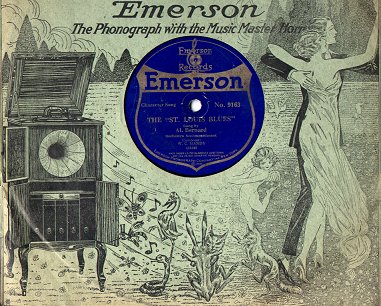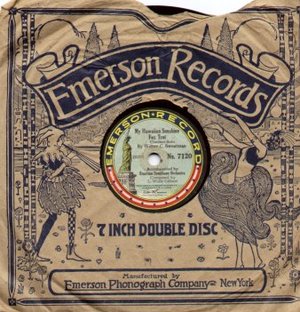Emerson Records
|
|
Emerson Records was a record label active in the United States of America from 1916 to 1928.
Emerson was founded by Victor H. Emerson, who had worked for Columbia Records since the 1890s. In 1916 he started his namesake company, producing 7 inch gramophone record selling for 25 cents each, and 5 & 1/2 inch discs selling for 10 cents. Early fare included popular tunes, dance numbers, and patriotic marches, mostly recorded by small groups of unnamed musicians hired in New York City credited as the "Emerson Orchestra" or sometimes grandly "The Emerson Symphony Orchestra". In January of 1918 Emerson added a line of 9 inch records selling for 75 cents. After World War I Emerson started ambitious expansions of the business, and in 1919 finally introduced a line of 10 inch discs (the common industry standard) retailing for 85 cents, which went up to $1 each the following year. At the same more popular "big name" artists were hired to record for the label, including Wilber Sweatman, Eddie Cantor, the Six Brown Brothers, and the Louisiana Five. Somewhat later the label also recorded Lizzie Miles, Eubie Blake, Fletcher Henderson, and the Original Memphis Five. 1919 also saw the debut of a series of 12 inch Emerson discs, mostly of Classical music, retailing for $1.25.
In May of 1920 Emerson opened a second recording studio in Los Angeles, California.
EmersonRecords1919.jpg
Emerson's expansions turned out to be over-extended to be supported by the economy, and the company went into receivership in 1921. In May of 1922 investors Benjamin Abrams and Rudolph Kararek purchased the Emerson Company for $50,000, and raised an additional $200,000 of capital for the business. Emerson records were then sold for 50 cents each. In 1924 the investors sold the company to the Scranton Button Company of Scranton, Pennsylvania. Emerson switched to the electric microphone method of sound recording in 1926. Scranton Button Co. halted production of new records by its Emerson subsidiary in 1928, but continued to use the name for a line of radios.
Emerson Records from the 1910s and early 1920s are gernerally above average audio fidelity for the era, pressed in high quality shellac. The fidelity of the later 1920s issues compares less favorably.


